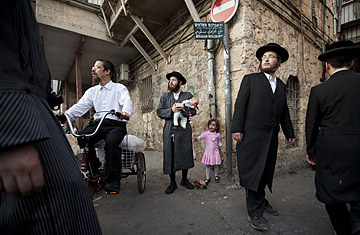
Ultra Orthodox Jews attend the funeral of Rabbi Yosef Shalom Elyashiv in Jerusalem, Wednesday, July 18, 2012. Elyashiv, revered by Jews worldwide as the top rabbinic authority of this generation for his scholarship and rulings on complex elements of Jewish law, died Wednesday, hospital officials said. He was 102.
(6 of 6)
In Kiryat Yovel, most of the new arrivals are gentler, even sly. The latest eruv countermove was to forgo wire and demarcate a boundary with an array of potted plants. Indeed, Pinchasi's victories may prove to be small battles in a larger war that he and those like him are losing. Religious Jews may account for less than 20% of the neighborhood's 21,000 residents, but they keep arriving. "Ten, 15 years from now, it's all going to be ultra-Orthodox," says a religious resident named Itzick, who moved in three years ago. "It's certain. It's clear. All the neighborhoods that are secular are old people. There are no young people coming."
But the fight's not quite over yet. In a mark of the neighborhood's strategic importance, secular families are organizing to buy property in Kiryat Yovel. The effort, dubbed New Spirit, began with a group of Hebrew University students who were unwilling to join the stream of young seculars exiting Jerusalem. "People do not feel together anymore. I think this is the major challenge in Israel today," says one of them, Nir Yanovsky Dagan. "For me, Jerusalem is the center of the story." The 10 fellow liberals in his self-made community banded together in something like one of the kibbutzim of early Israel. Dagan and his wife just signed to buy a flat in a building specifically swarmed by secular young families. It wasn't easy. The ultra-Orthodox get subsidies, as do many who buy on the Palestinian side of the Green Line (where Dagan says city officials urged him to go). "I want a pluralistic city again," he says.
There are signs it might be working. This year the number of secular students in Jerusalem schools actually increased, after 15 years of decline. On the other hand, Dagan says one community is thinking of moving together to Bet Shemesh because its members can't find affordable shelter in the capital.
At his desk in city hall, Pindrus smiles indulgently. "Be serious," he says. "These 20 families, nice youngsters, come out of college, they're going to change the area? Very nice." He has 50 of his people living unseen like sleeper cells in an ostensibly secular neighborhood at the city's southern border. "This is the reality in Jerusalem," says Grylak, the ultra-Orthodox magazine editor. "Demography is geography."
